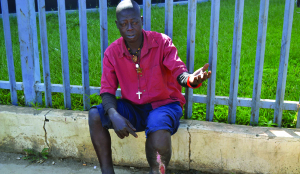By JOWIT SALUSEKI –
FOR close to 17 years now, Chisala Mumba has been living in pain and tears because of a cancerous wound that has developed on his left leg.
The excruciating pain that he endures on a daily basis is visible on his face as he sits on the pavement near Lusaka’s Farmers House and Central Park on Cairo road where, he positions himself in order to beg for alms from well-wishers.
For him to at least fill his purse with some few Ngwees, Chisala has to start off from his K50 rented room located in John Laing Township.
He targets people rushing to work during the early morning peak hours.
He has been on the street for the past 15 years.
Many who have been seeing him on the streets could have mistaken him for one of the truant street kids that the Government in 2006 began recruiting and placing them in training centres under the auspices of the Zambia National Service (ZNS), a government military wing that provides trade skills, such as carpentry and tailoring.
But following their graduation, most of them have returned to their old habits on the streets.
On a good day, Samaritans would give Chisala some money amounting to K10, while on a bad day he goes back home empty handed.
Nonetheless, he does not despair as he has to get back to town the following morning knowing that, his days of survival, depend on the little alms he manages to beg on the street.
The amount he is able to solicit on the street is carefully budgeted for as he has to buy foodstuffs and keep some for his monthly rentals that are pegged at K50.
When the going gets tough, his neighbours could come to his aid even though they too live on shoe string budgets despite the high poverty levels characterising densley populated townships.
Born in 1976 on the Copperbelt mining border town of Chililabombwe, Chisala trekked to the capital city in 2000 with the hope that Lusaka will perhaps offer him a better life and proper medical care.
Alas, he was wrong. Not only has his misery worsened but the wound that he thought would one day heal, has exacerbated to a point where he is fearing that sooner than later, his leg will be amputated.
On how the condition of the wound started, Chisala recalls that in 1998, he developed a mere sore on his left leg which he thought was going to heal within a few days after seeking medication from Chilabombwe Mine Hospital.
This is the same hospital in which, coincidentally, he was born back in the days.
To his dismay, instead of the sore getting healed, it started developing into a big wound while his left leg was also growing bigger and bigger as days went by.
When he arrived in Lusaka in the year 2000, Chisala, who had and still has no relatives in the capital city, decided to find accommodation in the sprawling township of John Laing.
This is an informal residential area located on the western part of Lusaka.
Seeing that the situation was not improving, he visited Mother Theresa hospital in Lusaka’s Kabulonga-Mtendere area to seek medication.
He was attended to besides being advised to be cleaning the wound on a regular basis with salty water and Lifebuoy soap.
In all the past 17 years of enduring a painful cancerous wound, Chisala has never been to the University Teaching Hospital (UTH) for any specialised treatment claiming that he can’t manage to pay for the medical bill which will be incurred in the process of seeking medical help at the country’s main referral hospital.
“I stay alone and sometimes depend on hand outs from my neighbours who are also constrained because they have their own problems to attend to in their various families.
“Added to my dilemma, I don’t have any relatives in Lusaka who can help me out …if I had any, I would have preferred to be staying at home as the pain that am enduring while sitting on the street begging is unbearable,” says Chisala while trying to hold back tears.
He sometimes regrets and curses himself for making a ‘wrong’ decision of trekking to Lusaka on the assumption that he was going to live a good life in the capital city.
Chisala claims that a named prominent politician is one of his relatives who can help him financially though he does not know where he can find him so that he assists him with resources to get back to his home village in Samfya.
“He is a relative of my father Mr Mwewa Mumba who lives in Samfya.
He is my cousin because he used to call my father “bayama” (uncle in the Cibemba dialect) when we were living in Chililabombwe,” he says.
At the moment Chisala’s mind is preoccupied with the thoughts of going back to his village in Samfya and is appealing to the Government and other well-wishers to help him with transport money so that he goes back to his roots.







